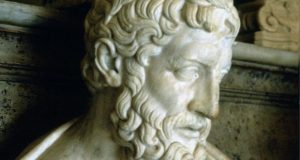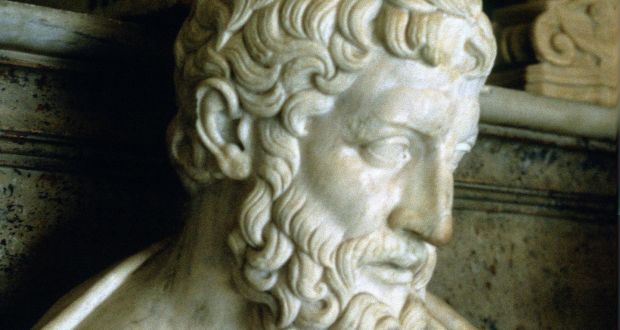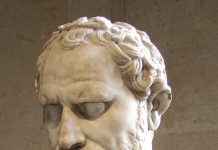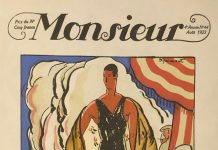This book makes the point that Lucretius was a linguistically creative poet. While author Barnaby Taylor does not draw a comparison between Lucretius (94-55 BCE) and Shakespeare, their ability to fashion neologisms on demand to express a newly creative idea set them apart from most other playwrights and poets.
According to Taylor, “The anxieties that Lucretius voices about the power and resources of his own language [Latin], may be understood in the context of contemporary concerns about the value of Latin philosophical literature as compared with Greek.” In his landmark text The Nature of Things, Lucretius set his ambition at the highest possible goal: “to expand and explore the resources and potential of Latin as a language of enlightenment.”
The author begins by looking at the work of Epicurus (341-270 BCE), born nearly 250 years before Lucretius (this book is just as much about Epicurus as it is about Lucretius). Epicurus established a linguistic theory that was largely adopted by Lucretius, one that featured two types of naturalism. By employing a combination of the ideas “language use is a function of human nature”, and “there can exist a natural fit between a name and its referent,” Epicurus sought to explain why the words we use are attached to the things or ideas they represent.
Epicurus adopted “the compulsive stimulus-response model” under which “early humans were not free to name things as and when they pleased.” Rather, the names given to things were “driven by nature”. It was only in the second stage of human development that names were selected by reason. Taylor here quotes Epicurus himself: “First, then, we must grasp the things subordinated to words, so that we can refer to them when judging matters of opinion, inquiry, or difficulty, and that we may have discrimination in all things as we prove things to infinity, and not have empty words.”
Epicurus was not the only voice in the linguistic arena. In scholarly books, the author sometimes assumes a level of familiarity with the subject matter that is perhaps not warranted.
On page 56 he states that Metrodorus adopted a naming practice according to which “a thing can be referred to by any name at all and no name is better than any other.” Or, in the words of Shakespeare, “a rose by any other name would smell as sweet.” Taylor does not employ the Shakespeare allusion, and neither does he tell the reader who Metrodorus is. (Even worse, Metrodorus does not even merit an Index entry.) While he is known as an exponent of Epicureanism, Metrodorus (331-277 BCE) clearly broke with Epicurus on this crucial point.
Epicurus adopted the use of metaphor as a “resource for assigning names to abstract concepts”, and it is this method that was adopted by Lucretius.
In The Nature of Things, Lucretius created a vehicle for linguistic experimentation, one that his readers had to learn and accept as they proceeded through his book. He created nothing less, writes Taylor, than a new social element within Roman society – “a new linguistic community whose members share in a specialized dialect.” However, there was one thing even Lucretius backed away from naming: the fourth substance of the soul, the one responsible for sensation. “It is entirely without name,” wrote Lucretius, “and there is nothing more mobile than it, nothing more fine, nothing composed of smaller or lighter particles.” Taylor explains the inability to compare it with anything else is why it lacks a name.
Lucretius wrote specifically of Epicurus in his book, especially in one passage where he conceives of Epicurus as a conquering general, whose “imaginative casting of the mind into the farthest reaches of the universe enabled him to learn the truth of nature.”
Taylor, however, does not take the easy road which simply accepts the Lucretian “militarization of the Epicurean project.” Lucretius further alludes to Ennius’ famous description of the Roman war against Pyrrhus in the First Punic War (264-241 BCE). “It is this correspondence that may complicate the ‘familiarizing’ reading of Lucretius’ military metaphors for philosophical inquiry and contemplation,” writes Taylor. This is because Pyrrhus was a notable enemy of Rome, and “Epicurus already had a reputation for irreligion.”
Remember that The Nature of Things was no ordinary book, but one that sought to forge a new social alliance. Introducing the “Pyrrhic nature of Epicurus” created a challenge for the reader: “to align oneself with Epicurus is to risk estrangement or alienation from an element of one’s own Roman identity. What is more, the assimilation of Epicurus to Discordia constitutes a shocking reversal of Ennian values; Epicurus’ portrayal in Ennian terms here actually runs counter to the forces and ideals of Ennian epic.”
There is a remarkable depth of richness in this book, which is highly recommended. I will just briefly mention one such example where Taylor opens a mineshaft into the text of Lucretius to reveal another rare mineral. In this case it is Diaphora, a trope whereby a repeated word expresses a meaning different from that which it expressed when it was first uttered. Lucretius used this several times by setting out the history of a word and “thus encourages the readers, upon encountering novel secondary usages, to look to and compare the primary, literal use of the term.” This sets up a task for the reader, “tracing back meanings across the history of the language.”
Lucretius described his own verse as honey on the rim of a cup. Taylor lets one not only taste its sweetness, but understand the rich metaphorical constructions Lucretius developed to create one of the world’s most enduring books.
Barnaby Taylor is Fellow and Tutor in Classics, Exeter College, University of Oxford
Lucretius and the Language of Nature is $80 from Oxford University Press.














